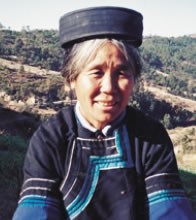Naluo in China

Photo Source:
Copyrighted © 2026
Operation China, Asia Harvest All rights reserved. Used with permission |
Send Joshua Project a map of this people group.
|
| People Name: | Naluo |
| Country: | China |
| 10/40 Window: | Yes |
| Population: | 49,000 |
| World Population: | 49,000 |
| Primary Language: | Naluo |
| Primary Religion: | Ethnic Religions |
| Christian Adherents: | 32.00 % |
| Evangelicals: | 26.00 % |
| Scripture: | Translation Started |
| Ministry Resources: | No |
| Jesus Film: | No |
| Audio Recordings: | No |
| People Cluster: | Tibeto-Burman, other |
| Affinity Bloc: | Tibetan-Himalayan Peoples |
| Progress Level: |
|
Introduction / History
Despite insisting on their own distinct identity, the Naluo (also called Alu or Gani - Dry Yi) are considered part of the Yi nationality by the Chinese authorities. The Laka are a subgroup of the Naluo. The main difference between the two is sociohistorical.
For centuries the Naluo were despised as slaves and serfs of the Nasu people. In the early 1950s the slave/serf system was abolished by the Communist authorities. The humble disposition of the Naluo helped many of them see their need for God. Many responded to the gospel when Protestant missionaries moved to their area in the early decades of the twentieth century.
What Are Their Lives Like?
In the same way that numerous languages and dialects are spoken among the many branches of Yi in China, they also have numerous distinct cultures. Catholic missionary Paul Vial explained, "The Lolo [Yi] do not have a single term that can be applied to an entire nation or a race of men, no more for others than for themselves. With the Lolo [Yi], each tribe knows only the tribes around it; beyond this horizon, it knows nothing. In their books, the author uses the name of his tribe, sometimes in a limited sense, if it is a particular history; sometimes in a broad sense, if the history applies to the entire race."
What Are Their Beliefs?
Most Naluo are worshipers of spirits. Others have embraced Christianity, though many who profess to be Christians have retained their former animistic rituals. In the past each Naluo village had a resident shaman.
The first Protestant missionaries arrived in northern Yunnan in the early 1900s. Australian Arthur Nicholls was among the early pioneers of the gospel. Others joined him in a mission of love. Medical clinics were established, and large numbers of people were exposed to the gospel. Probably because of their history as a slave people, the Naluo were eager to accept the offer of freedom in Jesus Christ. They turned to Christianity, breaking themselves free from centuries of bondage to spirit worship. Thousands of Eastern Lipo and Eastern Nasu also came to Christ in the Wuding and Luquan areas.
What Are Their Needs?
Today there are an thousands of Naluo believers. Many of them meet in ethnically mixed congregations. The Naluo living in Yuanmou County have had less exposure to the gospel. In the past many Naluo believers used the Pollard New Testament in the Eastern Nasu language, but today most prefer to use the Chinese Scriptures.
Prayer Points
Pray for a concentrated effort to share the gospel in es where it is still weak, like Yuanmou County.
Pray for the Holy Spirit to move mightily in Naluo churches, moving them to love and good works.
Pray for a Christ-centered theology in Naluo churches.
Pray for disciples who will make more disciples.